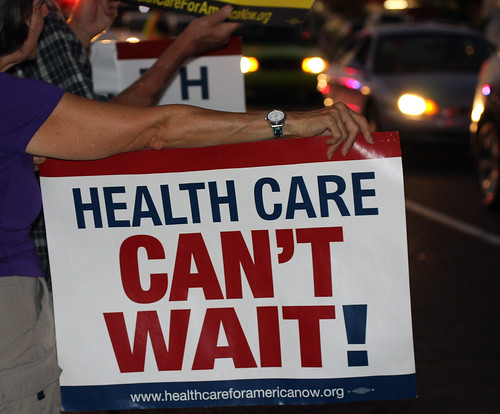
This news flash caught my attention this evening: Republican National Committee Spends Nearly $2,000 of "Party" Contributions at Lesbian-Themed Las Vegas Night Club.
Here's an article from The New York Daily News
Talk about a grand ol' party!
Records show the Republican National Committee dropped $1,946 at a West Hollywood, Calif. strip club last month, but a spokesperson insisted that RNC chairman Michael Steele was not among the ooglers.
"The chairman was never at the location in question, he had no knowledge of the expenditure, nor does he find the use of committee funds at such a location at all acceptable," said RNC spokeswoman Doug Heye, who added that the committee was investigating the expenditure.
Records filed with the Federal Election Commission show the RNC picked up the hefty tab at Voyeur West Hollywood, a high-end strip club that has hosted such notables as bad girl Lindsay Lohan and supermodel Heidi Klum.
In a review last October, the Los Angeles Times said the bar's "dark, leather-heavy interior is reminiscent of the masked orgy scene" in "Eyes Wide Shut," the 1999 Stanley Kubrick film starring Tom Cruise and Nicole Kidman.
The club features a heavy net suspended above the lounge area where topless performers - dressed in little more than masks and bikini-bottoms - writhe above the heads of clubgoers, the paper reported.
"Even more provocative scenes," the paper added, "are played out in an enclosed glass booth area adjacent to the club's dance floor area."
The kinky costs come at a time when Steele is already under fire from many within the GOP for his high-flying ways.
He recently took some heat for moving the RNC annual meeting from Washington, D.C. to Hawaii.
And one recent analysis by Politico.com found that compared with 2005, the last comparable year preceding a midterm election, RNC spending on private jets had doubled, limo trips had tripled, and meal expenses jumped from $306,000 to $599,000.
The RNC has still managed to out-raise the Democratic National Committee during most recent months, records show. But the DNC was more than happy to express a little mock outrage yesterday over the the RNC's latest expenditures.
"If limos, chartered aircraft and sex clubs are where they think their donors money should be spent - who are we to judge?" jabbed DNC spokesman Brad Woodhouse. "But it shouldn't give voters much confidence in Republicans when they say they want to get back in charge of federal spending."
Read more: http://www.nydailynews.com/news/politics/2010/03/29/2010-03-29_gop_family_values_michael_steeles_rnc_staffers_ran_up_almost_2k_at_strip_club.html#ixzz0jd96sSxV








